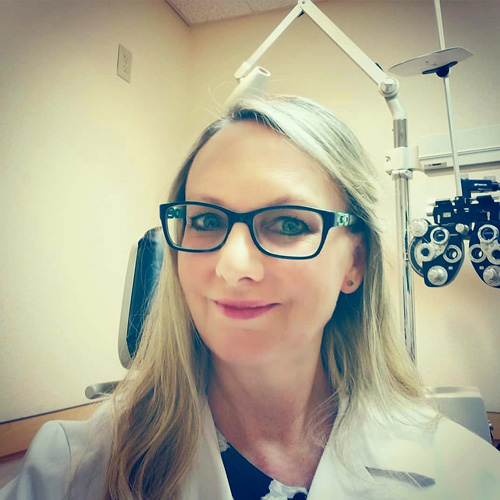

When it comes to career pathways, Diana Ford, OD, has walked a number of them. After her graduation from Indiana University School of Optometry in 1991, she completed a residency in primary care at Illinois College of Optometry. She stayed at the school for five years afterward, as an assistant professor. From there, she moved into an ophthalmology practice and worked at a corporate location on the weekends. Then she went to work for a large group ophthalmology practice where she managed difficult contact lens fits for keratoconus and post-laser surgery patients, as well as provided pre- and post-operative care.
When she and her former husband moved to Colombia, South America, for his work, she could not practice optometry in the country. “So I began teaching English to preschool and grade school kids,” she says. That interlude ended when she moved back to Georgia and worked first with another ophthalmologist and then a laser center.
Practical issues pushed Dr. Ford into looking for new work. She had been brought on as a contractor, and her health insurance premiums tripled, plus she was commuting an hour. “The situation was not working. Then I found my way here,” she says. Specifically, she found Doctor’s Exchange of Georgia, P.C., an independent optometric practice with offices across Georgia, including the National Vision, Inc.-operated Walmart Vision Center location where she works in Canton. “In every practice setting, I gained tremendous experience but I felt like there was a level of micromanaging going on. I don’t feel that here,” she says.
Dr. Ford had interviewed with several corporate locations, a choice she thought was particularly attractive for a single mom because of the flexibility and benefits. She landed at her current practice, as “they negotiated well with me, and settled on a four-day- a-week schedule that allows me to participate in my children’s after-school and band activities.”
Wrapping in experiences
In many ways, this role wraps up the best of what she had done in her earlier work. She loves teaching, and “there are teaching elements in patient encounters on a daily basis. I educate patients on their ocular health and vision, and they routinely tell me that it’s the best eye exam they’ve ever had,” she says.
Dr. Ford adds that while this feels like her own practice, she does not have the managerial worries that many of her friends and colleagues are facing. “I’m not interested in being an entrepreneur at this point. I am able to simply see my patients and provide them with a high level of care,” she says. She manages those medical conditions that make sense in a high-volume practice—red eyes and allergies for example—while referring out those conditions that would require more time.
Indeed, ODs who come into a setting like hers should expect to see a wide range of medical issues that optometrists who work in private practices where most patients have health and vision benefits might not see. “A lot of textbook kinds of cases walk through the door,” Dr. Ford says, and she is happy that these uninsured or under-insured patients have access to care in her office. She is confident with her skills and the care or counsel that she provides to these patients about their next steps.
A growing practice
Dr. Ford’s focus on patient education has helped the practice grow. “I’m seeing patients again and again, and we have gotten busier every year,” she says. Patients are now referring friends and family members, too. They often tell her that they appreciate her personal touch and attention. “I have worked in practices where patients spend two hours in the office and the doctor spends one minute with them. That’s not the experience they get here. My technician and I have a flow and system where we are efficient and friendly.”
She is glad she landed where she has. “Of all the things I’ve done and tried, this is the setting that seems to work the best for me,” she says. “The practice has been flexible with me, and I enjoy seeing my patients, doing my work and leaving the management of the business behind when I go.”



